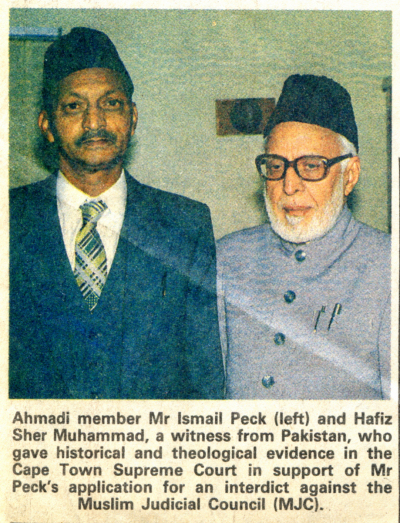A comment on Sir Zafrullah Khan’s “Re-institution of Khilafat”
Submitted by Ikram
Re-Institution of Khilafat by Sir Zafarullah Khan – a comment.
It is interesting to note that the sole justification for election of Khalifa-II after demise of Nurud-Din Sahib was that the assembled yelled in favor of said Khalifa. Hello! ever heard of “crowd for hire” tradition in Indo-Pakistan? Ever saw a state TV coverage of the head of states in Sub-Continent addressing herded masses? Irrespective of the sentiments of the apparently “independent minded crowd” and knowing the fact that intellectuals of the Jamaat had dissented on principle, it was morally incumbent on Khalifa-II to accept the role “thrust” on him in a transitional sense only and then he should had held Jamaat wide elections soon thereafter. But how could he, as it was an obviously staged crowd. One wonders what merits did Khalifa-II have been able to demonstrate at that point of his life when he was only twenty-five. The author of the article himself admits that due to eye ailment said Khalifa was not even a high school graduate. These are the same arguments that masses are asking now for the political dynasty taking shape in Pakistan.
Contrast this behavior with the principled stance of Muhammad Ali where the author writes – “…The Sahibzada Sahib … finally said that he and those who saw eye to eye with him were prepared to make the covenant of Bai’at at the hands of anyone whom Maulvi Muhammad Ali Sahib and his group might put forward for the office of Khalifa; but Maulvi Sahib would not agree.”
Muhammad Ali or like-minded could have put forward his own name but he did not. As a candidate Muhammad Ali had a lot to offer but did not. His stand was to preserve supremacy of institutions over personalities to which the author refers to – “…Sadar Anjuman Ahmadiyya was the true successor of the Promised Messiah and that anyone else who might be elected as Khalifa, and there could be several such persons, would have only an honorific position, but would exercise no authority…”
In the same article, the Electoral College appointed by Khalifa-II that elected Khalifa-III comprised of the following:
1. The surviving sons of the Promised Messiah.
2. The President of the Sadr Anjuman Ahmadiyya.
3. All Secretaries of the Sadr Anjuman.
4. The director General and the Directors of Tahrik Jadeed.
5. The President of Waqf Jadeed.
6. The Principal of the Talim-ul-Islam College.
7. The Headmaster of the Talim-ul-islam High School.
8. The President of the Theological Seminary.
9. The President of Ansarullah.
10. The President of Khuddam-ul-Ahmadiyya.
11. Representative of Lajna Imaillah.
12. Missionaries who had worked abroad for a minimum period of five years.
13. Missionaries who had worked within Pakistan or India for a minimum period of five years.
14. Ameers of circles in Pakistan.
15. Members of the Movement who had joined the Movement in the lifetime of the Founder of the Movement.
16. The total membership of the college is approximately one hundred and fifty.
This so-called “Electoral College” of Rabwah Jamaat has everyone included except the Electorate itself i.e. the representation of the commoner of the Jamaat which can be classically summed as “Too many chiefs and no Indian.” In any democracy, e.g. United States, each eligible citizen has the right to vote and the net win by a party in a particular state then becomes the component of national Electoral College. In sum total, unless a commoner has cast his/her vote, the Electoral College does not even come into existence.
Except line items 1 and 15 above, which are irrelevant now because of passage of time, each and everyone in the list was a relative or an appointee by the Chief Executive i.e. Khalifa-II and most likely in a salaried position. How can a subservient go against the wishes of the Master. No wonder that the façade of the Rabwah “Electoral College” has a juggernaut hold on the institution of Khilafat that historically has proven to be the proxy of the wishes and interests of the famous “Khandan.”
It is ironic that in order to sanctify Khalifa-II the above linked article tries to make comparisons between him and Umar-ibn-Khattab RA. What the author fails to mention that Umar was no son of Muhammad and drew little salary or perks of his office. He walked his personal camel to Jerusalem and back despite having the national treasury under his jurisdiction, not the First Class air travel and five-star hotels from mere donations of the members. Just so that both died the same way, does not make them equal at least not in this world. All that can be said is that We know Umar; Khalifa-II you are no Umar.
Of note are the contents of the Will of Nurud-Din Sahib (Khalifa-I) where he writes, “…My children are young and there is no money in our house. Allah is their Guardian. No provision should be made for them out of any fund for orphans and the needy. A loan might be provided for them which should be repaid by those of my sons who grow up into a position to do so….”
Any takers of the such standards of Khilafat? … Khalifa-II onwards?

According to an article published by BBC Urdu the total number of Ahmadiyya community in India is One hundred thousand.…
----Jul 27, 18:49